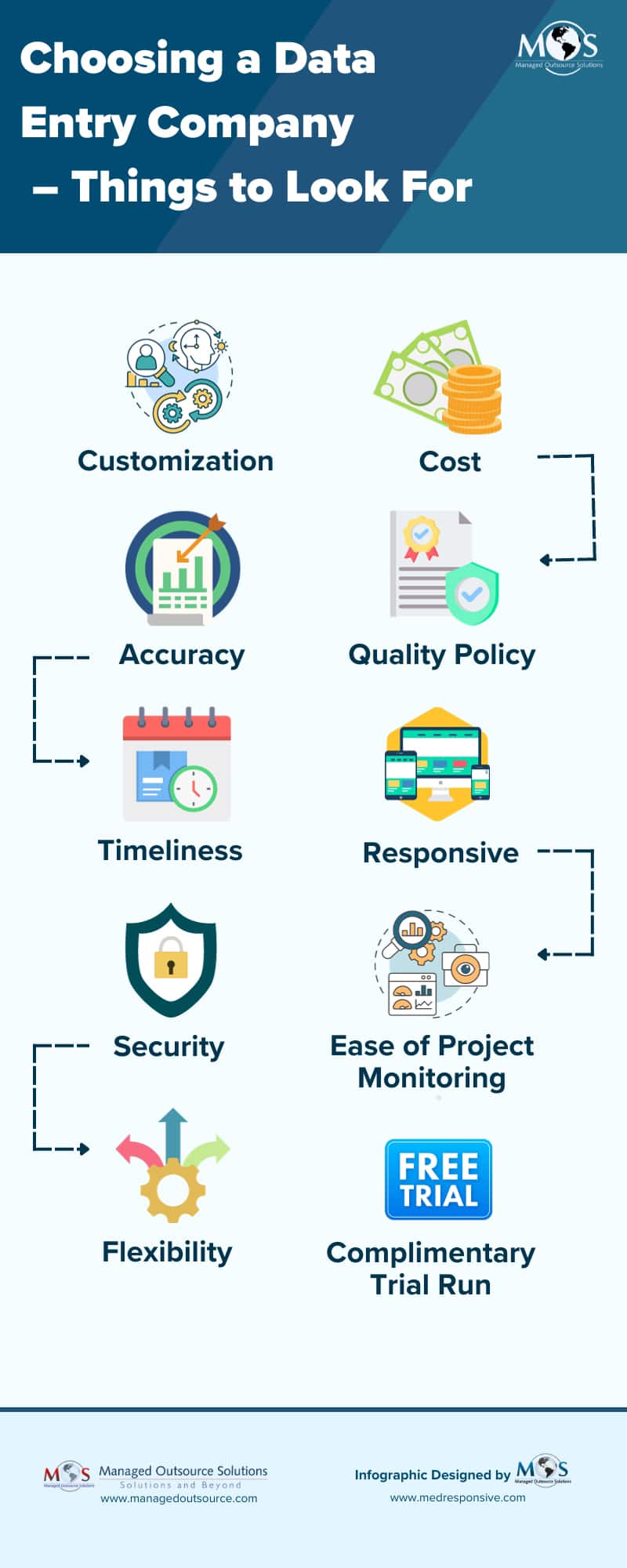Data entry plays a vital role in many industries. Having timely accurate data is crucial for companies to make informed decisions, manage customer relationships, and track business performance. Data entry is a time-consuming, tedious, and error-prone task. Any company that deals with large amounts of data or information can benefit from data entry services. Having experts on the job can ensure accurate, consistent, and up-to-date information. Additionally, outsourcing is a cost-effective way to ensure data quality as you focus on your core business activities.
Data Entry Outsourcing: 10 Best Practices
To succeed with outsourcing your data entry, you need to consider various factors. The most important thing is to choose the right company. Here are ten best practices for effective data entry outsourcing:
- Tailored solutions
Every industry has distinctive data entry requirements that prevail. Opt for a service provider capable of delivering tailored solutions that align seamlessly with the specific needs of your project, organization, or system. Experts will collaborate closely with you, comprehending your requirements thoroughly, and customizing the data entry process to suit your unique preferences. For instance, when it comes to your company’s Customer Relationship Management (CRM) system, a tailored data entry approach involves refining forms and fields to systematically gather specific customer preferences. This facilitates a more precise capture of customer preferences, optimizing your targeted marketing campaigns.
- Accuracy and timeliness
Accurate data entry is paramount, as even a minor error can lead to substantial consequences. A trustworthy service provider will have robust error tracking and rectification measures, ensuring the precision of each data entry. Assess the outsourcing company’s practices, especially their regular audits to evaluate the accuracy of processed data. In addition to accuracy, turnaround time plays a pivotal role in selecting an outsourcing partner. A company that values time is dedicated to meeting deadlines and delivering results promptly, all while upholding the highest standards of quality
- Security
Security is an important concern when outsourcing data entry when sensitive information is involved. Your outsourcing partner should have stringent data protection protocols in place, ensuring your information remains safe and confidential throughout the process. This includes data privacy protocols, encryption protocols for data transmission and storage, access controls, and compliance with data protection regulations.
- Flexibility
Choose outsourcing services that offer flexibility in adapting to changing requirements, and can handle increased workloads without compromising on quality. For instance, scalability in data entry is crucial for an e-commerce company that constantly adds new products to its online platform. Each product requires entry of information relating to various attributes like product name, description, images, pricing, dimensions, and category assignment. Seasonal demands, expansion and localization are other circumstances that call for scalability data entry.
- Technology
Check if the company employs advanced software tools specifically designed for data entry. For example, OCR technology extracts text from images, enabling automated data entry from physical documents. Advanced technologies streamline the process, offer validation checks, and allow for customization, improving accuracy and efficiency.
- Cost
Cost is influenced by many factors such as the volume of data to be processed and its complexity, use of specialized tools and automation, and so on. Evaluate these factors along with the quality of service offered. Remember that opting for the lowest-cost provider might compromise accuracy, reliability, or data security.
- Quality policy
Make sure that the company has stringent quality policies in place to ensure that the input data is error-free and meets the highest standards. Quality checks and assurance measures such as dual keying or validation processes, might increase costs but ensure the accuracy and reliability of the services.
- Responsive
When choosing an outsourcing partner, it’s important to find someone who communicates effectively. You don’t want to hire a company that is difficult to work with or doesn’t have good communication skills.
- Ease of project tracking and monitoring
Managing an outsourced project involves a lot of responsibilities, and if you don’t have a framework in place, it can become difficult. The first step to keeping track of an outsourced project is hiring the right people. Testing and monitoring are the best methods to guarantee that your outsourced project goes successfully. Performance monitoring and reporting in data entry involve systematically tracking and evaluating processes and their outcomes. They include measuring the accuracy and efficiency of data entry, error identification, compliance assessment, and others.
- Free trial
Before you begin collaborating with a new outsourcing provider, ensure they offer a complimentary sample run. This allows you to assess their capabilities firsthand. Numerous outsourcing companies are willing to furnish a free trial for performance evaluation.
While evaluating these factors, conduct a thorough cost-benefit analysis to ensure that the outsourcing arrangement provides value for money. Before you make the outsourcing decision, weigh both the direct costs and the potential savings in terms of time and resources. By paying attention to these matters, you can optimize the benefits of partnering with a data entry company, streamline your operations, and focus on your core competencies.
Contact us today for a detailed discussion on how we can elevate your data entry endeavors!





